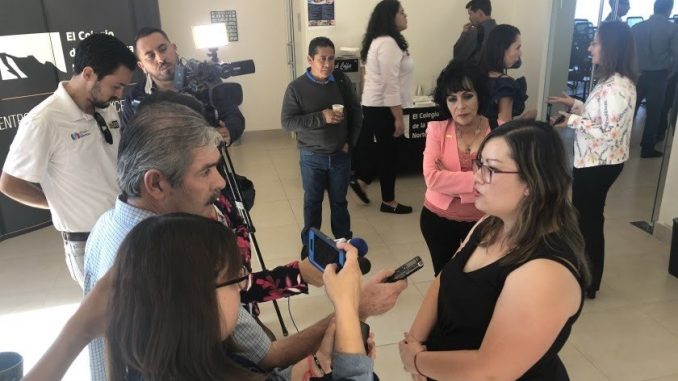
The number of people requesting asylum in Mexico has increased by about 53 percent amid the Trump administration’s effort to push Mexico, Guatemala, El Salvador and Honduras to accept more migrants, most of whom come from Central American countries.
By the end of 2019, the number of asylum seekers to Mexico is expected to reach 80,000 — that is double compared to figures in 2018 when large northward-bound migrant caravans drew international attention.
Mexican government and immigration officials gathered Monday in Tijuana at El Colegio de la Frontera Norte to discuss resources for handling the increase in refugees in the northern border region.
So far in 2019, the number of people requesting refugee status in Mexico has increased from 39,000 in 2018 to more than 60,000 people already this year, according to the head of Mexico’s refugee agency, Andrés Ramírez Silva.
Ramírez, the chief of the Mexican Commission for Refugee Assistance, led the conference titled “Characteristics of the new wave of refugees in Mexico.”
Hondurans represent more than half of the refugee applications received by Mexico, followed by Salvadorans, Ramírez said.
“There is deterioration of life that causes them to have no quality of life and protection in their countries,” he said, adding that Mexico accepts about 70 percent of refugee applications it receives.
Ramírez said the government of Mexico is obligated to attend to everyone who arrives at its southern border.
“All of us have to account for the large number of people who arrive,” Ramírez said. “International protection begins. We have to attend to them. We have to register them. We have to interview them. We have to analyze their case and determine whether or not the person is a refugee or requires complementary protection. And (we) also refer them to public institutions so that they can also access public services and be able to integrate into Mexican society.”
Ramírez said Mexico is also seeing large numbers of refugees from Cuba, Venezuela and Haiti. He said an unraveling political and economic situation could erupt and prompt many more refugees from Haiti to arrive in Mexico by the end of the year.
(snip)
In August, Mexicans made up the largest percentage of people caught crossing the U.S. border illegally or being stopped at official border crossings, surpassing Honduras, the latest U.S. Customs and Border Protection data shows.
“The right to national and foreign migrants is a constitutional right; it is a human right and must be addressed equally to all,” Pérez Canchola said.
More recently, the city of Culiacán in Sinaloa erupted in violence last week when Mexican authorities captured and then released Oviedo Guzmán López, the son of the notorious narco-trafficker, Joaquín Archivaldo Guzmán Loera, known as “El Chapo.”
Pérez Canchola said Tijuana and Baja California had to prepare to receive and provide resources to large numbers of Mexicans who will be arriving in northern border states after the violence in Culiacán.
“The United States is closing the door on everyone,” he said.
Another troubling trend is the sharp increase in unaccompanied minors arriving in Baja California, according to attendees of the conference, which included shelter directors, congressional leaders from Mexico City and immigration authorities.
Pérez Canchola said 40 percent of the migrants arriving from Central America are minors, families with children, babies and unaccompanied minors, although he did not give a specific percentage or number of unaccompanied minors.
Though the conference was aimed at addressing challenges brought on by the increase in asylum-seekers to Mexico, the authorities took a much different tone than their immigration counterparts in the United States.
Congresswoman Julieta Vences Valencia, who serves as the president on the Committee of Migrant Affairs, echoed a perspective often shared by Mexico’s president Andrés Manuel López Obrador.
“It’s a great truth … They don’t leave for pleasure,” said Vences Valencia of migrants. “They leave for the necessity they have to look for an opportunity for them and their family to survive.”
*see full story by San Diego Union – Tribune